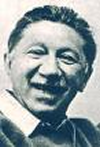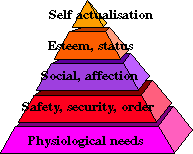Abraham Maslow part 1
Background
Maslow's hierarchy of needs is a theory in psychology that Abraham Maslow proposed in his 1943 paper ‘A Theory of Human Motivation’, which he subsequently extended. His theory contends that as humans meet 'basic needs', they seek to satisfy successively 'higher needs' that occupy a set hierarchy. As depicted in the diagram above.
Maslow studied exemplary people such as Albert Einstein, Jane Addams, Eleanor Roosevelt, and Frederick Douglass rather than mentally ill or neurotic people, writing that "the study of crippled, stunted, immature, and unhealthy specimens can yield only a cripple psychology and a cripple philosophy." (‘Motivation and Personality’, 1987)
Maslow's hierarchy of needs is often depicted as a pyramid consisting of five levels.
The four lower levels are grouped together as ‘deficiency needs’ associated with ‘physiological’ needs, while the top level is termed ‘growth needs’ associated with ‘psychological’ needs.
While our ‘deficiency needs’ must be met, our ‘being’ needs are continually shaping our behaviour.
The basic concept is that the higher needs in this hierarchy only come into focus once all the needs that are lower down in the pyramid are mainly, or entirely satisfied.
Growth forces create upward movement in the hierarchy, whereas regressive forces push the more influential needs further down the hierarchy.
Deficiency needs
The deficiency needs (also termed 'D-needs' by Maslow) are:
Physiological needs
The physiological needs of the organism, those enabling homeostasis, take first precedence. These consist mainly of:
- The need to breathe
- The need for water
- The need to eat
- The need to dispose of bodily wastes
- The need for sleep
- The need to regulate body temperature
- The need for protection from microbial aggressions (hygiene)
When some of the needs are unmet, a human's physiological needs take the highest priority.
As a result of the influential nature of physiological needs, an individual will de-prioritize all other desires and capacities.
Physiological needs can control thoughts and behaviors, and can cause people to feel sickness, pain and discomfort.
Maslow also places sexual activity in this category, as well as bodily comfort, activity, exercise, etc.
By creating a good environment in which to work, good salaries and the ability to gain incentives this need can be alleviated.
Safety needs
When the physiological needs are met, the need for safety will emerge.
Safety and security ranks above all other desires. These include:
- Security of employment
- Security of revenues and resources
- Physical security - safety from violence, delinquency, aggressions
- Moral and physiological security
- Familial security
- Security of health
A properly-functioning society tends to provide a degree of security to its members.
Sometimes the desire for safety outweighs the requirement to satisfy physiological needs completely.
To help here instigate safety rules and protocols, review overall security issues, treat everyone the same.
Love / belonging needs
After physiological and safety needs are fulfilled, the third layer of human needs are social.
This involves emotionally-based relationships in general, such as friendship, sexual intimacy, and / or having a family.
Humans want to be accepted and to belong, whether it be to clubs, work groups, religious groups, family, gangs, etc.
They need to feel loved (sexually and non-sexually) by others, and to be accepted by them.
People also have a constant desire to feel needed.
In the absence of these elements, people become increasingly susceptible to loneliness, social anxiety and depression.
By showing concern and encouraging group behaviour and communication and social events this areas needs may be met.
Esteem needs
Humans have a need to be respected, to self-respect and to respect others.
People need to engage themselves in order to gain recognition and have an activity or activities that give the person a sense of contribution and self-value, be it in a profession or hobby.
Imbalances at this level can result in low self-esteem, inferiority complexes, an inflated sense of self-importance or snobbishness.
Try to empower and give plenty of positive feedback, create opportunities for development, get opinions and involve people in the decision making process.



